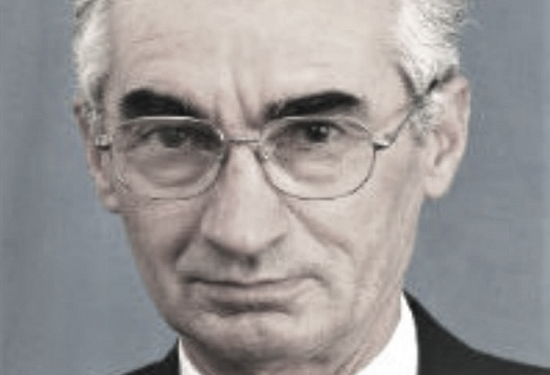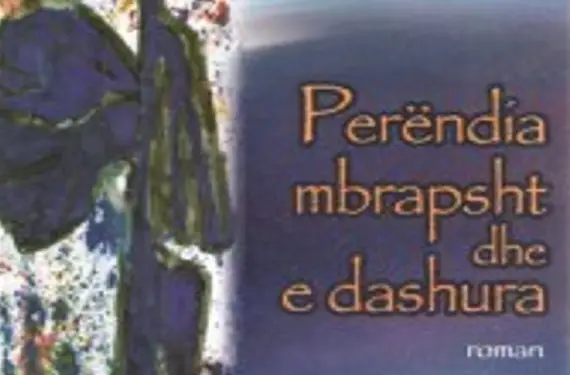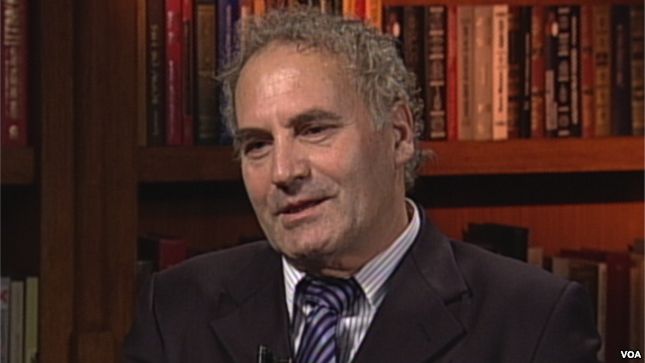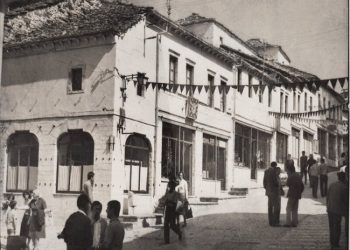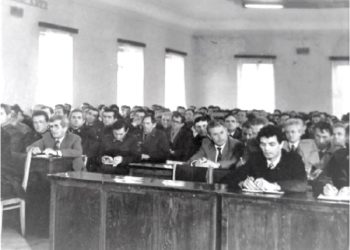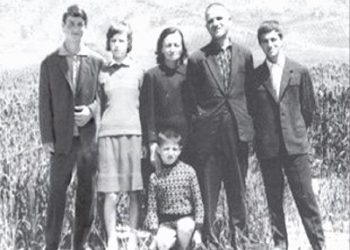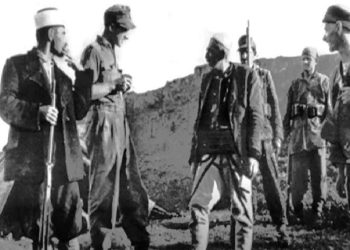By Eugene Merlika
-THE NOVEL OF DREAMS THAT BECOME STRONGER EVEN AFTER THE MURDER!-
(Reflections from the reading of “God’s back and Beloved”, by Visar Zhiti)
Memorie.al / “God back and girlfriend”, the novel by the well-known writer Visar Zhiti, has a provocative and thought-provoking title. It is a title that carries within itself the inspiring and guiding ideas of the work. It is not an expression of denial or affirmation, as it may seem at first glance, even though the elements of these concepts are not foreign to him. There is a clearly defined symbolism in the finding of that title, the consummation of a squeezing of vital material to extract the quintessence, the essence which, at the same time, is the reflection and generalization of an experience that far exceeds the feats of a man’s life or of a society in a certain period of its existence.
The novel has at its center a love story, at the time of punishments during the communist dictatorship, in the land of hatred, exiles and political prisons. It was a love with a capital D, one that encapsulates and forcefully unfolds all its possible manifestations, from physical passion, the power of flesh and blood to the ideal, poetry, supreme pleasure along with pain exhausting and annihilating and the self-sacrifice that its dimensions, willy-nilly, make obligatory in the last tragic presence of the main element of the couple. But love continues even after death, it has the power of immortality.
The first spark of this love ignites in an unusual environment, in a courtroom, in which a young girl, a high school student from Shkodra, answers before a jury of the dictatorship of the proletariat for her ideas, expressed in school and outside, ideas that conflict with the communist regime and a hardened reality based on the dogma of violence and deception. In that hall there happens to be a soldier, a young man from Lushnja, the author’s place of residence, for whom the image of the beautiful “reactionary” girl remains embedded in his mind and rooted in his heart.
The spark of that court day turns into a big flame after a few years when the girl, exiled in remote Bedat, on the edge of the Karavasta marsh, after serving her sentence, meets the boy who came every day from the city to work in construction. It is one of those “forbidden” loves, for the destruction of which, in the Albanian “Absurdland” an entire party and state apparatus was activated that spoke and acted through the State Security, the most typical and wildest representatives of the “proletarian state “.
Ema Marku and Feliks Kondi are skillfully portrayed by the author and emerge from his pen as living people, with whom the reader sympathizes and has the impression that he has known them for a long time. Their destiny grabs him, makes him a participant in their life, in every particle of it, makes him rejoice, rejoice, sue, fight, get excited, feel the pain, the disappointment, the awareness of the impossibility to change the course of events in the civil battle to establish that order of things, in which the individual is not conditioned by the state in the creation of his life.
The individual and the State, the relationship between them, mutual dependence, the love-hate complex, the limits and proportions of the fusion of common destinies, from life to dream and vice versa, the responsibilities of each in the permanent conflict that inevitably accompanies the millennial march of humanity towards known and unknown paths, towards freedom, that of the interior first, these are the dominant motives of the work, they constitute the civic concern of the writer. He does not treat them academically, as the drama of his novel is set in times and settings that are analyzed with chilling realism.
It belongs to the period of two decades, the last one of the communist system in Albania and the first one of democracy, when hopes were born. It is a period that carries the most diverse phenomena, from the violence and arbitrariness of the “socialist” police state, to the demagoguery of the “democratic” one, from the extreme poverty of the years of “continuity”, to “eating grass”, do not bend, to the completeness of the market of a country freed from the shackles of state planning, whose population, with a drop of the stick, turned into an emigrant of biblical proportions and a merchant in its overwhelming part.
In this time and historical framework, the love of the young couple takes shape, blossoms and goes to its tragic end, a love that, in the author’s view, constitutes the most powerful challenge to the world of crime. That tragedy is the natural daughter of a society that comes from a criminal system, in front of which “Dante’s Hell” is a pale image, passing through a very short “purgatory”, consisting of planting illusions, changing jackets and triskash party, from a majority of converts to democrats, who took the breath of the newly started democracy, in which the perpetrators of crimes cannot punish themselves, and even gain immunity in the name of the principles that until a day ago called “bourgeois”, “reactionary”, “reprehensible”, for whose affirmation tens of thousands of citizens of Albania, including the characters of this novel, have been sent to the slaughterhouse for half a century.
It is this discovered nervous problem in which the writer’s thought constantly revolves, it is the motive for the exhausting weaving of his character through the long-desired and dull Europe, where the bag of indictment papers never finds a judge’s table to open it unfolded.
The new time in which Ema and Felix believe, is full of hopes and illusions, especially for former “class enemies”, for those who spent their years in prisons and internment camps. But the disappointments will soon come that, in Zhiti’s novel, reach the climax in the murder of the main character, Emma, distinguished in that period for her intense activity in the indictment and condemnation of the dictatorship.
The couple, while enjoying free love while trying to improve life in their country, encounters every day the representatives of the past crime, people already enriched and placed in high positions of the democratic administration. Thus the Operative officer of the Security, who tried to separate the couple at the dawn of love and recruit Felix, becomes one of the leaders of the pyramid firms, the biggest financial fraud suffered by the Albanians, in the short history of their democracy, and then newspaper director!!!
The one who had arrested the young student became the director of Anti-Crime in the Ministry of the Interior, apparently for his prominent “skill” in the detection of crimes, such as the one who was punished by Article 55/1 of the former Criminal Code. The first secretary, who had signed the arrest, appears every day in the bar where Ema and Felix want to drink a coffee, privatized by his wife. “We also need to privatize the prisons, one of our friends said, Emma was telling…”!
The disappointment of the novel’s main characters is a reflection of the disappointment of the vast majority of Albanians, which manifested itself in various ways: through mass emigration, the writings that managed to be published, the systematic increase in the number of those who did not vote, the cooling and indifference to the very concept of ‘Homeland. Citizen and Motherland, symbol and reality, feeling and mutual duty at the end of the millennium, wrapped in life and dream – here is another track in which the writer’s concern flows, a bold topic that breaks the deeply rooted taboos of Albanian thought.
Should the Motherland be identified with its ruling class? Can the love for her be the same for all his sons even when for many of them he is not a mother but a stepfather, even a murderer? What goals should be sacrificed for him and to what extent should the fate of the citizen be shared with his own?
In the previous regime, service to the Motherland was a deceptive synonym for service to a dictatorship that trampled on all human values. As a result, the real concept was reversed, since the interest of the Motherland was opposite to that of the power that officially represented it. In democracy, where the citizen must be the master of his own destinies, in theory not the Motherland, but his political class, must be identified with it, as an expression of the aspirations, will and personality of its people.
But when democracy is also damaged by the form of clan war for power and illegal enrichment, when it takes in its direction the caste of State Security spies with the mindset of the past, when it puts obstacles in every path of renewal of hopes for change, it is the legal right of citizens to seek their fate in the big world and at the same time to seek compensation for the injustices suffered and to dream of the great trial for all. This novel also dares trial for the Motherland, it is the first.
Rights and duties – a pair of notions that harmonizes the relationship between the citizen and the Motherland, between the citizen and the State, between the citizens, the past and the present. That society that manages to establish a balance between them is a model to be taken as an example. The further away from that model, the more unjust and sinful her life is. This is also one of the conclusions of the philosophy of this work.
For the main character of the novel, Ema Marku, who lives at the crossroads of two eras, “one that doesn’t want to die and the other that is powerless to give birth”, the Motherland is not just handcuffs in wet hands, the loss of virginity in an interrogation cell after a rape by “protectors of order”, conviction in a trial that has nothing in common with the original principles of justice, serving a sentence in a forced labor camp, among a multitude of innocent victims, deportation without motive after serving the sentence, the exile of his parents to a deep mountain village, the attempt to deprive him of the only beautiful thing that life gave him, love.
The homeland is also the object where dreams and illusions for a better life begin, for a country that places at the foundation of its being the freedom and prosperity of its children, that cleanses itself of sins, that strongly punishes crime, that gives priority to the moral and material compensation of opponents and victims of violence, that is capable of building a society where justice, mutual respect, and meritocracy prevail.
The heroine of the novel is an idealist, a worthy representative of the Albanian girl persecuted by the dictatorship, an invaluable reserve and precursor of a society that aims to remake itself through a true democracy. She suffers but also fights, she lines up at the barricade of the healthier part of her people, she is not spared, she stands out and is targeted by the followers of darkness, those who, like the chameleon, have only changed the color of their skin, but who remain in the depths of the forces of evil, of reversal, of lawlessness, of crime. Emma ends up killed.
The author of the novel is a writer who does not like contrivances, happy endings. He has the great merit of reflecting in art life, era and society as they unfold now. In the novel, the role and symbolism of a character is taken by a great, mysterious mirror in the antiquity of its world-eight. That mirror is broken on the day of the novel’s heroine’s funeral, broken by the impact of the corner of her coffin. The pieces of broken mirror glass symbolize the breaking of hopes, illusions, and life.
If optimism does not take on triumphant tones in the writer’s work, it exists in his consciousness and message, in the search for good, light, and if gray and black colors dominate its picture, it is not a subjective lack of the writer, but a truth we face every day.
His style and philosophy is not owned by the prisoner of the third zone of Spaç, but by the Albanian citizen and artist aware of his mission, who observes, ponders, comes to conclusions, who loves his country more than anything else. , who loves the best, fairest, healthiest, most advanced, most respected, “a pure, washed Motherland, not with blood, no, but with water. With the ordinary water of life”. That’s why he sues, cries, sits through his characters, sings love, not only as a creature of flesh and dreams, but also as the main constituent element of the world towards which he tends and for which he fights with all the strength of his feather.
The killing of Emma becomes a symbol; it is the killing of the dream, which becomes stronger than death, defying it. We dreamed of European Albania, the Homeland that moves forward, that has the strength to remove the tumor of evil from its body that gives hope to future generations. Her murder remains without a perpetrator and without punishment, like those of Vera Duma, Bujar Kaloshi, like many others in the nineties. However, the fight continues, through Felix who has shared with him not only the bed of love, but also noble aspirations. His action is now moved outside Albania, it requires more space. In Albania there is no place for idealists, they are destined to lose…!
Feliks Kondi leaves for Europe armed with a bag of documents and with an idea embedded in his brain: to sue the Motherland in the International Courts, to reveal to the public opinion his tragedy and that of his Country, to look for Emma who promised him that, “you will find me running away”! The undertaking is difficult but the character’s will is great.
The journey to Europe starts from Italy, beyond the sea so much connected with the past for better and for worse and with the projects of Albanians for the future, the place where the young couple’s walk on the free continent will start. The first person he meets in Rome is an old family friend, Omer Starja. His name covers that of Dr. Mentor Çokut, a point of reference for many Albanians who came to Italy in the first years of exile.
The author describes it with great kindness and respect. For those who knew him, they immediately find that he was a simple and loving parent and teacher. But he was one of the most prominent personalities of the Albanian diaspora, a lifelong supporter of freedom, a patriot, a far-sighted politician with a broad culture who gave his help, even though highly recommended advice at the highest levels, in the formation healthy of the new Albanian democracy.
In him and his family, Felix found an oasis of comfort and understanding and the first aid, so much needed, for anyone who undertakes the path of exile for the first time. In that warm environment, the vision of the marriage bed appears, as a mirror of broken happiness. Accompanied by him or his niece, a law student, Felix gets to know Rome and its thousand-year-old monuments. With their help, he arranges the documents, finds different jobs, starts to collect money, and even helps his mother and sister who are students in Albania.
But this life in exile, unlike hundreds of thousands of other Albanians all over the world, could never become a normal life. The character’s personality is strongly conditioned by the loss of his girlfriend, which, irrationally, he looks for in every girl he comes across in the paintings of the great masters or in those he encounters every day.
Equally powerful is the anxiety that gripped him in order to realize his goal of testifying to the world his tragedy and lawsuit: “I am gripped by a great anxiety and a great sense of guilt, everywhere I find guilt, his evidence, I gather them, I organize them, I hide them like a fool, I scream, I come to my senses, I don’t know where to go, every departure leads me to her broken trunk and bloody dress. This is my temple now, holding me up. I want retribution, but such as she deserves, as her voice commands me…”!
His life becomes frenetic, he passes from one European country to another, between testimonies, conversations with compatriots or locals, who fail to catch the message he wants to convey. So absurd and unbelievable are the events he tells about “the only place in the modern world that has condemned not only people, but also names, graves, even horses, trees and even photographs…”, that “the listeners ran away from the meeting without being sure who was crazy: the referee or the country he came from or both together”!
Little by little, new walls begin to rise in the consciousness of the character, even if sometimes made of glittering glass, but still walls, exactly from that Europe which, in half a century of darkness, had been for the illusions of the Albanians a ray of light, a hope, but also because of sufferings and punishments, after going to prison because its writers and philosophers, so-called “reactionaries” were read, why its songs were listened to, why its artists and athletes were sympathized, why its politicians were talked about, simply why it was dreamed about to.
When, after the opening of the frontiers, we went to Europe, which had been the green oasis where our illusions had sunk to escape the scorching wind of the desert that surrounded us, we regrettably saw that few, if not none, displayed an active understanding and essential appreciation of our particular ordeal of prisons and detentions. Even our testimonies were sometimes annoying, because the victims of communism were of a different category.
Europe did not like to talk about them, because its mouth was always filled with the victims of Nazi-fascism. Its parliament rejected a resolution by the Swede Lindblad, which asserted nothing more than the fact that: the victims are such and should be treated as such, regardless of whether the executioners are called fascists, Nazis or communists.
The hero of Visar Zhiti’s novel contradicts this mindset and attitude of Europe, which was giving shelter and support to quite a few executioners with “proof of persecution” and the names of its cities such as The Hague, Brussels, Luxembourg, Strasbourg, remained only mirages of a project that would never be realized, because for their institutions there is no communist crime, even his Emma was killed by the fascists…!
The overwhelming emotional burden together with the bitterness stemming from the impossibility of realizing a life’s dream form a suffocating mixture that often leads to a self-destructive end. Felix Kondi ends his life by jumping from the bridge over the Danube, in the ancient capital of the former friendly Empire of his Homeland, after completely renouncing the lawsuit he would make against the latter.
But the ignorance remains in the philosophy of the work, in the mother-conscience of the reader, in the belief that dreams, even if they are killed, revive and flourish in other people who will continue to fight to build the society of hopes. This is the author’s credo, even in the last moments of Felix, two shadows are cast upon him, connected to his tragedy and that of his beloved daughter, representatives of that caste that condemned and perhaps killed his Emma. “What do you want?” he said with the anger of the gods. Don’t regret it, let’s push you…”! Unrepentant killers to the end, crime professionals.
Felix and Emma meet in another world where, it is hoped, there are no secretaries, operatives, policemen to weave their misfortune. The novel ends with a suicide and the reader is left with bitterness in his mouth, because the work is an endless chain of disappointments, which the author reflects with a dizzying and powerful literary style, doing a great service to his fellow countrymen of his generation and, perhaps, even greater to those to come.
The work presents aspects of the time it refers to, it has the value of its testimony, but like any literary creation, it does not undertake to perform the function of a file with documents, already historical. The story of its main heroes, despite the piercing authenticity of the presentation, cannot be generalized nor does it make it typical of Albanian society. We are dealing with a novel that is based on the aesthetics of pain and the exaltation of feeling, which constitutes an anthem for the Albanian woman, condemned by the dictatorship and gives her personality in its entirety.
I tried to elaborate a part of the author’s ideas, a more complete analysis, especially that of artistic knitting, mixed with the damaged psyche of a time, would require more space. However, I consider the novel “God back and beloved”, one of the most accomplished works of our literature of the new era, in which we should have had more works of this type and of this level, reflections of a reality that, even though we have left it behind, it will continue to condition us for a long time, especially in the field of culture. Memorie.al
June 2010




